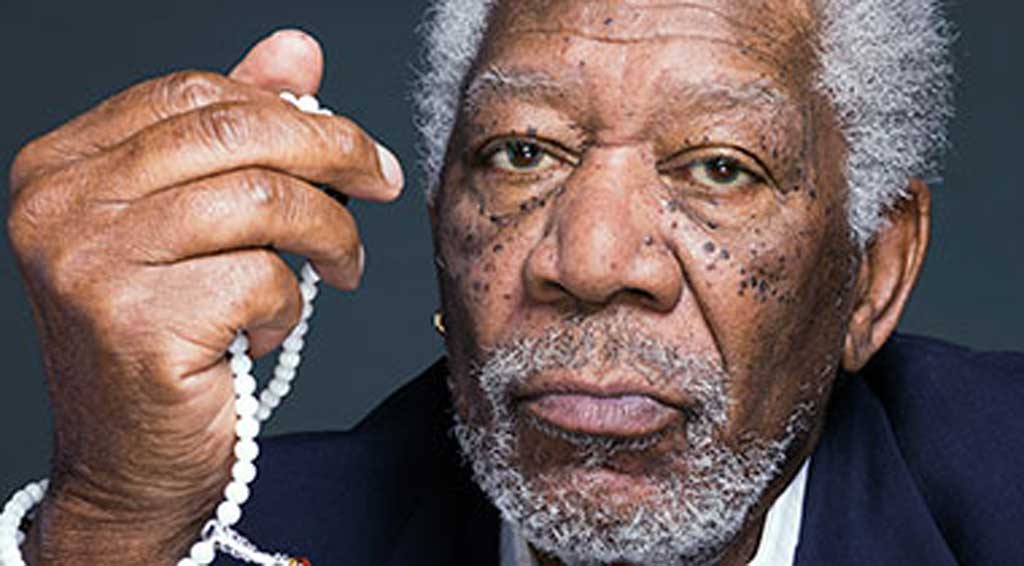By Lori Acken
By his very nature — the soulful eyes and regal bearing, legendary voice and sonorous delivery — when Morgan Freeman tells you something, you believe it. You just do. Hence, the Oscar winner is frequently tapped to play noble sorts — doctors, lawmen, statesmen, even revolutionaries like Nelson Mandela and Malcolm X.
Even God.
And God is the reason Freeman is here today, seated beside his Revelations Entertainment partners Lori McCreary and James Younger in a Pasadena hotel suite. Not because he’s portraying God. Because he’s seeking him and all that he entails in a world that too often seems to claim religion to sanction godless actions. And he’d like to take you with.
Freeman and his collaborators joined forces with National Geographic Channel to create the astounding six-part series The Story of God With Morgan Freeman (Sundays beginning April 3), which explores how religion has evolved throughout the ages and, in turn, shaped mankind’s progression, too. For fans of Freeman’s Emmy-nominated Science Channel series Through the Wormhole — and for Freeman, himself — The Story of God is a natural evolution from Wormhole’s premiere, which took a fascinating, but distinctly scientific, approach to the notion of a divine creator.
Each episode explores a separate but universal theological quandary: Who — or what — is God? Can sacred creation beliefs coexist with scientific theory and advancement? Is the devil truly hell’s proprietor or the manifestation of humanity’s desire to curb human nature and explain away evil? Are miracles evidence of God, or our longing to experience something beyond the mundane? Do modern global conflicts really signal end times — or is our ability to monitor them 24/7 the only thing that’s new?
And the granddaddy of all human wonderment: What happens when we die?
In the process, Freeman visited nearly 20 cities in seven countries — from Jerusalem’s Western Wall to India’s Bodhi Tree to Mayan temples and Egyptian pyramids and even Joel Osteen’s 43,500-member Lakewood Church — participating in rites and rituals, conversing with the faithful and immersing himself in a world’s worth of theology.
To their delight, he and his team reveled in an inspiring commonality.
“When you think about what is Islam, what is Christianity, what is Buddhism, what is Hinduism — everyone thinks that the other person’s religion is totally different from theirs and a completely different way of seeing the world,” Younger explains. “Our big discovery in doing this was they’re all fundamentally the same.”
But, Freeman notes, willful ignorance and intolerance keep some from embracing that. “The trouble we run into is those people who think that they have it. ‘I got it. Mine has it. I got the answer. I’m correct and you’re wrong,’” he says. “Yeah. Then you’re not just wrong; you’re hopeless. You’re lost.”
To that end, the group meticulously avoided any perception of judgment or proselytizing: “We don’t try to explain, because that’s religious politics and we want to separate the two,” Freeman says. Instead they opted for a thorough, enriching examination they hope will inspire educated (and educational) conversation. Especially as a 24-hour news cycle churns out so much hatred in the name of God.
“We’re trying to bring knowledge and say, ‘Look, you can understand something about, not what ISIS does, but what’s behind it and how, in fact, they’re perverting their religion,” says Younger. “We say, ‘Let’s go see where it stems from and have an understanding of it, just to be more enlightened.’”
For Freeman, The Story of God is a passion project — the culmination of decades of personal exploration. “For me, it’s not a quest for religious enlightenment,” he smiles. “It’s more of a quest just for human. Why does all — all — of humanity have the same thrust? And that thrust is toward understanding the un-understandable. The un-understandable is what we give the sobriquet ‘God.’ We’ve split the atom. We’ve discovered the Higgs boson. We know it exists. We have indisputable evidence of it. We have not actually seen it, but as long as there’s indisputable evidence — well, interestingly enough, Einstein said that’s just more proof of God.”
But what about proof that a big ol’ dirt nap isn’t all that awaits?
“The biggest question that we ask — the biggest question that we ask — is about resurrection,” Freeman agrees. “Because we cannot stand the idea of not being. The end of the universe is not what really concerns us; it’s will we be here? The end of us.
What drives this series, what drives religion, what drives faith, what drives our need” — he cocks an eyebrow — “that is what drives: Need. We need answers. We need to believe that it’s going to be all right. Particularly when the world blows up.”
So if faith gives you peace and makes you a more noble sort while you’re here, Freeman says that that’s God, too.
“I’ll give you a very mind-settling answer to afterlife,” he smiles, leaning in. “Life is continuous. There is no after. There was no before. Just life. Life is self-sustaining. Life doesn’t need anything but itself. Everything that dies, dies to feed. Everything that lives, lives on the dead.”
Brought to you by the publishers of TV Guide, the ultimate TV resource packed with celebrity news and commentary on what’s new and what’s good to watch. Get TV Guide at 88% off the cover price: call 800-866-1400 or visit tvguidemagazine.com. —©TV Guide 2016

